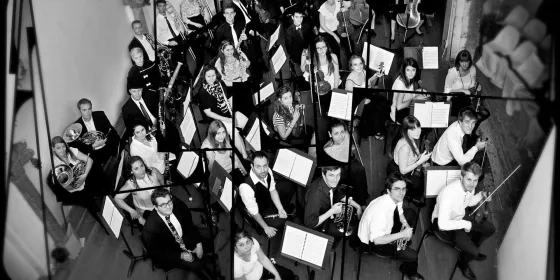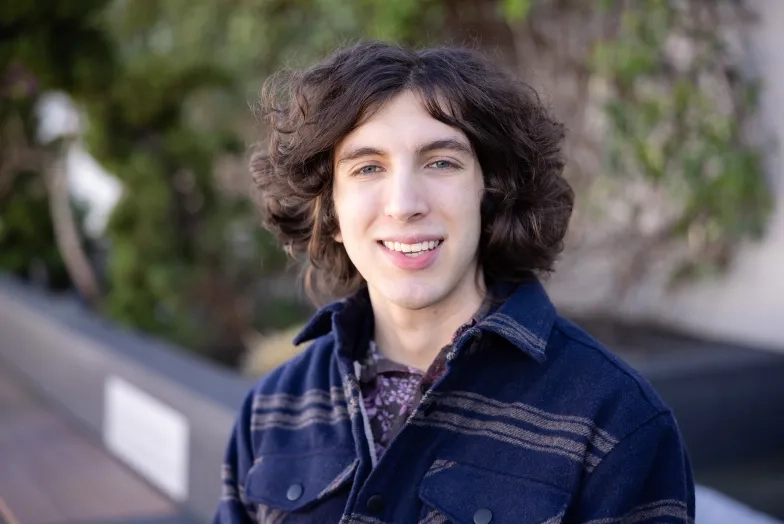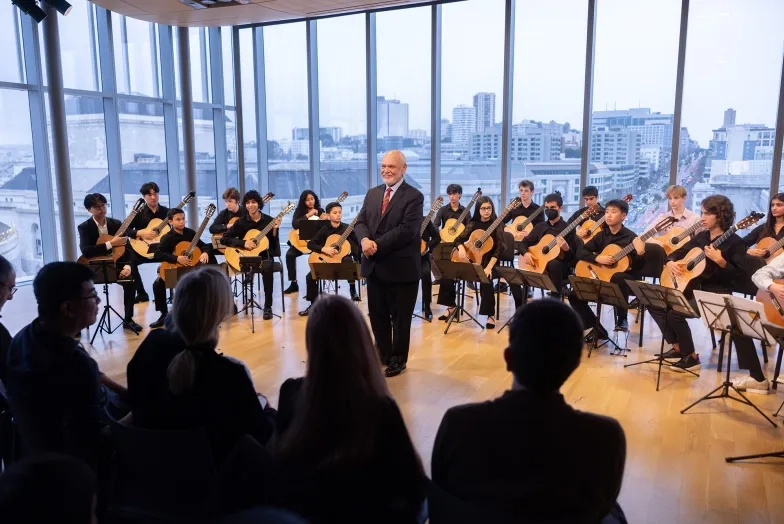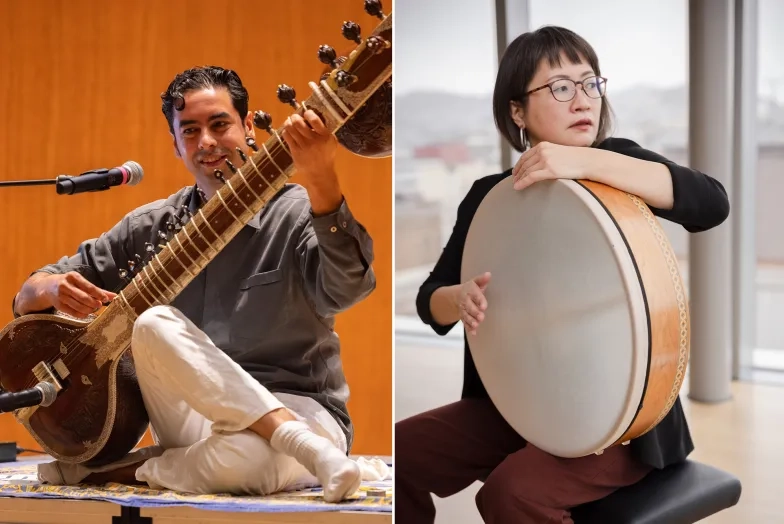SFCM Alums In It Together: One Found Sound
Popular wisdom says that for an orchestra to function, to have a vision, to attain greatness, it must be led by a great leader. The founders of One Found Sound, a conductorless, collaborative chamber orchestra based in the Bay Area, have turned this paradigm on its head.
Now in its fifth year, One Found Sound (OFS) was started by five SFCM graduates: Sarah Bonomo ’12, Georgeanne Banker ’12, Sasha Launer ’11, Emily Botel ’12, and Scott Padden ’12.
“The philosophy,” says Bonomo, “was to create an inclusive space where all members have an equal platform to express themselves and their ideas. Essentially, we hoped to bring the ideals of chamber music and democracy to an orchestral setting.” This means doing away with hierarchies, putting each musician on the same level, and creating a culture of transparency and communication.
The vision of OFS was not limited to the musicians’ experiences. Banker says, “It was also important for us to cultivate a relaxed, fun, and welcoming performance environment for our audiences.”
OFS engages with a diverse audience, drawing in people who may not be familiar with classical music alongside seasoned concertgoers. Once an audience has assembled, the ensemble seeks to forge a connection between listener and performer not often experienced in the traditional concert hall. Banker explains, “Since our first performance, we felt it vital to have no ‘fourth wall,’ to perform very close to our audiences, to provide drinks, and to encourage laughing, crying, clapping, and the use of phones.”
It’s all about forging a connection between audience and musician. The performers play standing, without a stage, putting everyone on the same level. With audience members sitting in close proximity to the musicians, the concert experience is especially intimate. Depending on the music, there may be as few as ten musicians, or as many as 40.
The early days of OFS were dedicated to building an ensemble that was in touch with the needs and interests of its community. Bonomo and Banker recall organizing their first informal rehearsal with fellow musicians. They played through the first movement of Beethoven’s Sixth Symphony, the “Pastoral,” and asked the musicians in attendance if they were willing to commit to OFS’s philosophy.
The founders explained their vision of breaking down the stigmas around classical music, encouraging audiences to be boisterous and engaged, and doing away with the hierarchical structure of orchestras to place the artistic vision in the hands of the musicians. Bonomo remembers, “The energy was electric and our colleagues were very excited, so we scheduled the first concert.”
Both Banker and Bonomo recall the steep learning curve they experienced as they created an ensemble from scratch.
“It was a challenge to figure out all the moving parts for our first concert,” says Bonomo. To put it all together, they had to think about the logistics of procuring music, where to hold rehearsals and how to run them (without a conductor, of course), and how to find enough music stands.
“It involved a lot of scrambling to figure things out,” says Banker. “We had to learn how we could start to receive tax-deductible donations, what a general liability insurance policy is, what the best marketing strategy might be, and how to spread the word about our ensemble.”
A big consideration was keeping operating costs low to be able to direct as much funding as possible to the musicians. With the help of a strategic planner, the founders of OFS came up with a five-year plan, and have stuck to it.
With the foundation in place, venues booked, music rented, and insurance paid, it was time to focus on the music. Initially, members were friends and colleagues the founders had met during their time at SFCM. (To this day, most of those same original members are still in OFS.) As word about the ensemble spread, their network of musicians grew, but the core members still make up a large portion of the ensemble.
But what sets OFS apart is the role of each musician in the ensemble. Unlike many large ensembles, each member of OFS is an equal player. “We strive to make sure everyone understands that it’s their creativity and dedication that makes OFS work,” says Bonomo. “We respect their individuality and treat each person with the importance of a music director.”
Five years in, OFS has proved that its strategy is a winning one. Looking back, Bonomo recalls numerous successes of the ensemble, from playing the US premiere of Jean Françaix’s Piano Concerto to the organization receiving its non-profit status.
“One of the most gratifying parts of OFS is seeing the joy on the faces of our audiences and musicians at the end of each concert,” Bonomo says. “In these moments, all the stress and hard work and late nights are worth it.”
For Banker, the connection forged between audience and performer is a point of pride. “Performing in such close proximity to the audience truly informs your own performance and creates a unique energy between musician and listener,” she says.
This became especially apparent during the organization’s 2014 Gala, which featured seven world premieres written by seven emerging Bay Area composers. “Having the privilege of performing these works for the first time and watching our audience respond to this brand new music was an incredible experience.”
At the OFS “5th Birthday Bash” gala, which took place at Heron Arts on April 27, 2018, the ensemble played a selection of favorite works from the past four seasons. Amid works of modern art on display in the venue, 200 guests enjoyed drinks, games, piñatas, and music, and raised $25,000 to support the 6th season of the ensemble. After the ensemble played, guests and musicians celebrated into the night to the music of DJ Johnny Hwin.
Looking ahead, Banker, Bonomo, and all the other founders and members of OFS see a bright future for their ensemble. “We have a long-term goal of making this organization a full-time, salaried orchestra with its own unique performance space,” says Bonomo. “But for now,” adds Banker, “we’re focusing on building our community and our reach within the Bay Area by performing at the highest level possible.”



